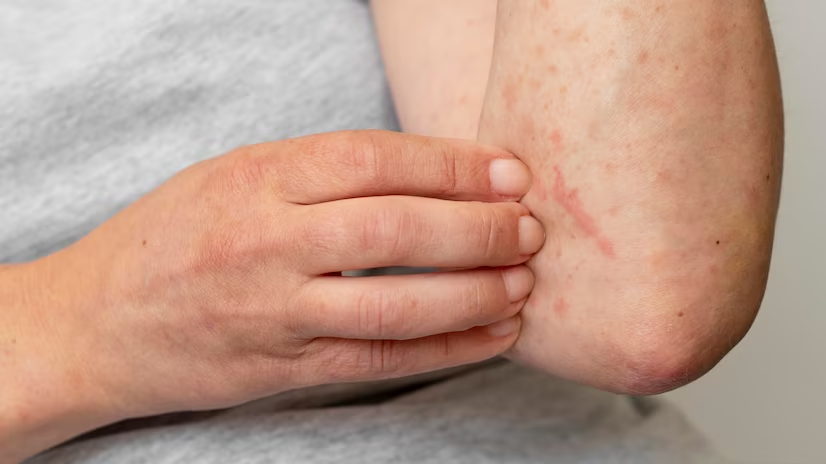
In our fast-paced modern lives, stress has become an omnipresent companion, affecting our overall well-being in various ways. But could it also have a role to play in the development or exacerbation of eczema, a common skin condition that plagues many individuals. This begs the question: Does stress cause eczema?
In this article, we will delve into the question that often plagues those dealing with eczema: "Can stress cause eczema?" By examining scientific research and exploring the mechanisms at play, we aim to uncover the fascinating connection between stress and this common skin condition. Join us on this informative journey to understand how stress may influence eczema and how managing stress can positively impact skin health.
What is Eczema?
Eczema, also known as atopic dermatitis, is a chronic and inflammatory skin condition that affects people of all ages, although it is most commonly seen in infants and children. It is characterized by patches of dry, red, itchy, and inflamed skin that can appear anywhere on the body. Eczema can vary in severity, with some individuals experiencing mild symptoms and others experiencing more severe flare-ups.
What Causes Eczema?
"Does stress cause eczema?" does not have a straightforward answer.
Soon after an eczema flare, if you think back about what your triggers were, most likely you will be able to find something stressful going on in your life prior to the flare. The more stressed you are, you tend to get worse eczema breakouts. However, the level of stress cannot be measured as it is very subjective.
The exact causes of eczema are not fully understood, but it is believed to result from a combination of genetic, environmental, and immune system factors. Here are some key factors that contribute to the development of eczema:
Genetics
: Eczema tends to run in families, suggesting a genetic predisposition. Certain gene variations are associated with an increased risk of developing eczema. People with a family history of eczema, asthma, or allergies are more likely to develop the condition.Immune system dysfunction
: Eczema is considered an immune-mediated condition, where the immune system overreacts to certain triggers, leading to inflammation and skin irritation. Individuals with eczema often have an overactive immune response and impaired skin barrier function, making their skin more susceptible to irritants and allergens. A weak barrier function of skin triggers your immune system response that leads to inflammation.Environmental factors
: Various environmental factors can trigger or exacerbate eczema symptoms. These can include exposure to irritants like harsh chemicals, soaps, detergents, and certain fabrics. Allergens like pollen, dust mites, pet dander, and mold can also worsen eczema symptoms in individuals who are allergic to them.Dry skin:
People with eczema tend to have dry and sensitive skin. The skin's natural barrier function, which helps retain moisture and protect against irritants, bacteria, allergens and environment factors may be compromised in individuals with eczema. This makes the skin more susceptible to dryness, itching, and irritation.Psychological and emotional factors:
Emotional stress and psychological factors are known to impact eczema. Stress, anxiety, and even certain emotional states can trigger or worsen eczema flare-ups in some individuals. It is believed that stress can disrupt the immune system and trigger inflammatory responses, leading to eczema symptoms.When you are in a state of stress, endorphins (feel good hormones) tend to be suppressed. Instead your blood cortisol (stress hormone) levels will go up in response to stress. This increases your heart rate and blood pressure as well as cause eczema flares in susceptible individuals. While stress contributes to inflammation and worsens eczema, it also hampers the skin’s ability to repair.
The Relationship Between Stress and Skin Health

According to a landmark 2020 patient survey called "Eczema Unmasked" conducted by NES (National Eczema Society), stress emerged as a powerful trigger for eczema flare-ups, as reported by those living with the condition. In fact, the survey revealed that stress was identified as the single biggest trigger of eczema flare-ups, with a notable gender difference. Significantly more women (57%) reported stress as a trigger compared to men (41%).
Eczema, a chronic and inflammatory skin condition, can cause considerable discomfort and impact the quality of life for those affected. While the exact causes of eczema are complex, the influence of stress on its development and exacerbation is gaining recognition within the scientific community.
What is stress?
Stress, often regarded as a natural response to demanding situations, when we are under pressure or feel threatened. It can elicit a cascade of physiological changes within the body. When we encounter a stressful situation, our fight or flight response is triggered. This primes our body into action. This response is beneficial to a certain extent. But if we are exposed to stress for prolonged periods, it can leave us drained or feeling overwhelmed.
When stress hormones such as cortisol are released, they can have far-reaching effects, including on the skin. Stress can disrupt immune responses, leading to an imbalance that can manifest as heightened inflammation. This inflammatory response can contribute to the onset or worsening of skin conditions like eczema.
Moreover, stress can compromise the skin's natural barrier function, leaving it more vulnerable to irritants and moisture loss. This can further exacerbate eczema symptoms and trigger flare-ups.
The Mechanism Behind Stress-Induced Eczema: Understanding the Link

The question of whether stress can cause eczema has sparked significant interest in the field of dermatology and psychodermatology. While the exact mechanisms are still being unraveled, emerging research suggests a complex interplay between stress and the development or exacerbation of eczema symptoms.
When we experience stress, our body's response involves the release of stress hormones such as cortisol. These hormones can affect various physiological processes, including those related to the skin. Here are some key mechanisms believed to be involved in stress induced eczema:
Immune system dysregulation
: Stress can disrupt the balance of the immune system, leading to an overactive or altered immune response. In the case of eczema, this dysregulation can result in increased inflammation and skin sensitivity, contributing to the development or worsening of eczema symptoms.Barrier dysfunction
: The skin's barrier function plays a crucial role in protecting against irritants, allergens, and moisture loss. Chronic stress can impair the skin's barrier function, making it more susceptible to external triggers and increasing the risk of stress eczema flare-ups.Neuroendocrine interactions
: The skin and the brain are intricately connected through a complex network of nerves, neuropeptides, and receptors. Stress can influence these neuroendocrine interactions, leading to alterations in the skin's physiology and potentially triggering or exacerbating eczema symptoms.Itch-scratch cycle:
Stress can exacerbate itching sensations, which are common in eczema. The urge to scratch can provide temporary relief but may ultimately worsen the skin's condition by causing further inflammation and damage. This itch-scratch cycle can be perpetuated by stress, leading to a vicious cycle of worsening eczema symptoms.Scratching
: It can break the skin barrier and the risk of infection is high. Broken skin allows irritants and allergens (like pet dander and dust) that triggers eczema to enter through the barrier. This leads to an eczema flare.Scratching at night can disrupt sleep.
You may wake repeatedly at night to scratch because of excessive itchiness. Loss of sleep can make you distressed and worsen your stress. Taking an antihistamine and keeping your skin well moisturized can reduce itchiness and the need to scratch.Coping with Stress Induced Eczema

The impact of stress on our overall well-being, including its potential connection to eczema, cannot be underestimated. While the question of whether stress can cause eczema remains a topic of ongoing research, managing stress effectively plays a crucial role in minimizing eczema flare-ups and promoting skin health.
By adopting empowering strategies to cope with stress, individuals with eczema can take proactive steps toward managing their condition. Here are some key approaches:
Stress Reduction Techniques
Engaging in stress reduction techniques can help alleviate the impact of stress on eczema. Practices such as mindfulness meditation, deep breathing exercises, and progressive muscle relaxation have been shown to reduce stress levels and promote a sense of calm. Incorporating these techniques into daily routines can have a positive impact on both mental well-being and skin health.
Regular Physical Activity
Regular exercise has been recognized as a powerful tool for stress management. Engaging in physical activity releases endorphins, which are natural mood boosters, and helps reduce stress levels. Additionally, exercise promotes circulation and sweat production, which can be beneficial for the skin. Aerobic exercises like swimming, cycling and brisk walking for 15 -20 minutes at least 3 times a week can increase endorphins and keep cortisol levels low. Finding enjoyable activities, such as walking, dancing, or yoga, can make exercise a fun and sustainable part of stress management and eczema care.
Healthy Lifestyle Habits
Adopting a healthy lifestyle can support overall well-being and indirectly contribute to stress reduction. Getting adequate sleep, maintaining a balanced diet, and avoiding excessive alcohol consumption and tobacco use can help optimize skin health and resilience.
A healthy balanced diet rich in all nutrients including vitamins and minerals, ensures your body releases endorphins. However, carb and sugar rich diets will increase stress hormones. A good quality sleep for 6 -8 hours a night is important to keep your stress levels low. These habits create a solid foundation for managing eczema and minimizing the potential impact of stress on skin symptoms.
Social Support
Building a strong support network and seeking social support can provide valuable emotional assistance in times of stress. Connecting with loved ones, participating in support groups, or seeking professional counseling can offer outlets for expressing emotions, gaining insights, and learning coping strategies. Sharing experiences with others who have eczema or joining online communities can provide a sense of belonging and understanding, reducing the feelings of isolation that stress can exacerbate. Put your stressors out rather than bottling them in, so that it won't manifest as an eczema flare.
Skincare Routine and Moisturization
Establishing a consistent skincare routine tailored to the needs of eczema-prone skin can help maintain the skin's barrier function and minimize dryness and irritation. Regular and gentle cleansing, followed by the application of moisturizers and emollients, can help restore and retain moisture, reducing the impact of stress on skin sensitivity. Working with a dermatologist or skincare professional can provide personalized guidance on suitable products and routines.
Practicing Mindful Meditation and Relaxation Techniques to Combat Stress

Living with eczema can be challenging, especially when stress exacerbates symptoms. Fortunately, there are empowering strategies that can help manage stress and improve skin health. One such strategy is mindfulness meditation, which has been shown to have a positive impact on anxiety, depression, and pain.
By incorporating mindfulness into your daily routine, you can enhance your overall well-being and potentially alleviate eczema-related stress. Here's how mindfulness meditation can benefit individuals with eczema:
Stress Reduction
Mindfulness meditation involves focusing your attention on the present moment without judgment. By practicing mindfulness, you can cultivate a state of calmness and relaxation, which can effectively reduce stress levels.
Emotional Well-being
Eczema can have a significant impact on emotional health, leading to feelings of frustration, embarrassment, and even depression. Mindfulness meditation can help cultivate self-compassion and acceptance, allowing individuals to develop a healthier relationship with their condition.
Pain Management
Eczema flare-ups can sometimes be accompanied by physical discomfort or pain. Mindfulness meditation has been found to be effective in managing pain by increasing pain tolerance and reducing pain-related distress.
Improved Sleep
Eczema-related itching and discomfort can interfere with sleep, leading to increased stress and exacerbation of symptoms. Mindfulness meditation practices, such as body scan exercises and guided imagery, can help individuals relax and promote better sleep quality.
Enhanced Coping Skills
Mindfulness meditation fosters resilience and equips individuals with effective coping strategies to navigate stressful situations. By training the mind to stay present and non-reactive, individuals can respond to eczema-related stressors with greater clarity and composure.
Relaxation Techniques to Complement Mindful Meditation
In addition to mindful meditation, there are various other relaxation techniques that can be beneficial for combating stress and promoting overall well-being. These techniques can serve as valuable complements to mindfulness practices, providing diverse avenues for relaxation and stress reduction. Consider incorporating the following techniques into your routine:
Gentle Exercises:
Engaging in light and graceful exercises like yoga, tai chi, or ballet can help relax the body and calm the mind. These exercises focus on fluid movements, breathing techniques, and body awareness, promoting relaxation and reducing stress levels.Distraction Activities:
Engaging in enjoyable and absorbing activities can serve as effective distractions from stress. Writing, painting, playing video games, or knitting are examples of activities that can divert your attention away from stressors and provide a sense of relaxation and fulfillment.Acupuncture:
Acupuncture, an ancient practice originating from traditional Chinese medicine, involves the insertion of thin needles into specific points on the body. This technique is believed to help restore balance and promote relaxation, offering a potential avenue for stress eczema relief.Soothing Music or Nature Sounds
: Listening to soothing music or nature sounds has a calming effect on the mind and body. Incorporating gentle melodies, ambient sounds, or nature recordings into your environment can create a peaceful atmosphere conducive to relaxation and stress eczema reduction.Identify your triggers for stress
: Make a list of these stressful life events and find solutions to avoid them or face them in a productive way. Focus on the most important tasks. Nobody is perfect. If life is too demanding, learn to say ‘no’ sometimes.Positive thinking
: Even at the worst times, this will help us get through. Be grateful for what we have. See your life with a different lens without focusing on eczema. Believe in an eczema free life.Conclusion
While we continue to explore the question "can stress cause eczema," adopting a proactive and holistic approach to eczema management remains key in navigating the challenges of this skin condition. Understanding the mechanisms behind stress-induced eczema, such as immune system dysregulation and the itch-scratch cycle, can provide valuable insights into how stress impacts skin health.


